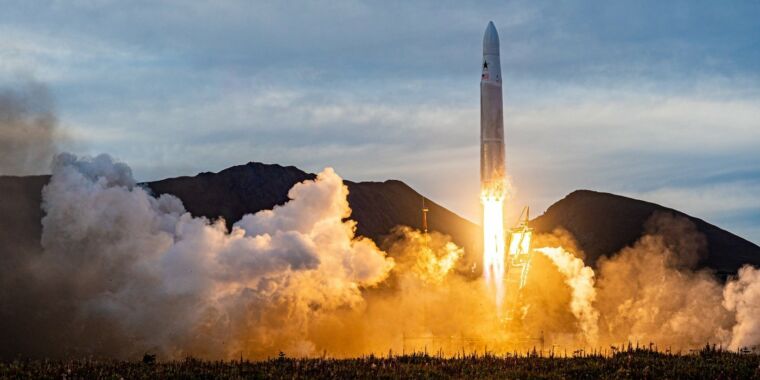
-
Rocket 3.1 takes off Friday evening from Kodiak, Alaska.John Kraus for Astra
-
The rocket's initial flight off the pad looked smooth.John Kraus for Astra
-
But at about 15 seconds or so into the flight it began to noticeably oscillate.John Kraus for Astra
-
Astra set up its rocket with a team of just six people.John Kraus for Astra
-
This was the company's second attempt to launch the vehicle.John Kraus for Astra
-
Astra uses mobile infrastructure for ground systems equipment.John Kraus for Astra
After months of technical and weather delays, Astra launched its first orbital rocket on Friday night from a spaceport in southern Alaska.
The stubby, small rocket's five main engines lit several seconds before liftoff, and then the booster named Rocket 3.1 began to climb into the deepening evening sky. Rocket 3.1 appeared to climb straight and true for about 15 seconds before it began to sway back and forth a little bit.
Later, the company's co-founder and chief technology officer, Adam London, would explain that a problem with the rocket's computerized guidance system introduced a slight roll oscillation. As this happened, the vehicle began to drift away from its planned trajectory.
At that point, it appeared as though the guidance system may be able to dampen the roll, but the rocket was getting perilously close to passing outside of its controlled flight area. To prevent the rocket from potentially falling into a protected area, therefore, it was commanded to shut down its engines. They had burned for about 30 seconds, or a little less than one-quarter of the planned first-stage burn.
"Overall, we're pretty pleased with what we have learned," London said on Saturday during a teleconference with reporters.
Based upon a preliminary review of data, Astra officials said they believe the problem occurred due to a flight software problem, rather than an issue with the rocket's first-stage hardware. Engineers with the California-based company plan to conduct an "extensive" investigation to ensure they understand the root cause of the failure.
Prior to the launch, Astra was quite clear that it did not expect this mission—which carried no payload—to reach orbit. The company's philosophy is that the best way to develop a rocket quickly, and at low cost, is to test its booster in flight. The company plans to reach orbit on the third of three test flights, and its chief executive, Chris Kemp, said Friday night's launch attempt keeps Astra on this path.
"This rocket is a completely new system, none of this has ever flown before," Kemp said. "There’s almost not a single part on this rocket that has ever flown. This is a fantastic result."
Founded in October 2016, Astra has limited its expenditures to date to about $100 million, in part by keeping its head count to a little more than 100 people. Kemp said the company anticipated failure because the best way to get data about the rocket's performance is not to perform endless simulations on the ground—the company's tests of its guidance and navigation system missed the roll issue—but rather to test hardware in flight.
"For us, what's expensive is not learning," he said. "This is one of the things that is very hard to test on the ground."
Armed with additional data, the Astra team will now prepare Rocket 3.2 for a flight test. This booster is already being assembled at the company's factory in Alameda, California. The first stage for Rocket 3.2 is similar to its predecessor, but the company has upgraded its second stage to give it a better chance of reaching orbit. This flight could happen "real soon," Kemp said.
Listing image by John Kraus for Astra
"first" - Google News
September 14, 2020 at 07:22PM
https://ift.tt/35DB36X
Astra finally launches its first orbital rocket, and it flew for 30 seconds - Ars Technica
"first" - Google News
https://ift.tt/2QqCv4E
https://ift.tt/3bWWEYd
Bagikan Berita Ini














0 Response to "Astra finally launches its first orbital rocket, and it flew for 30 seconds - Ars Technica"
Post a Comment